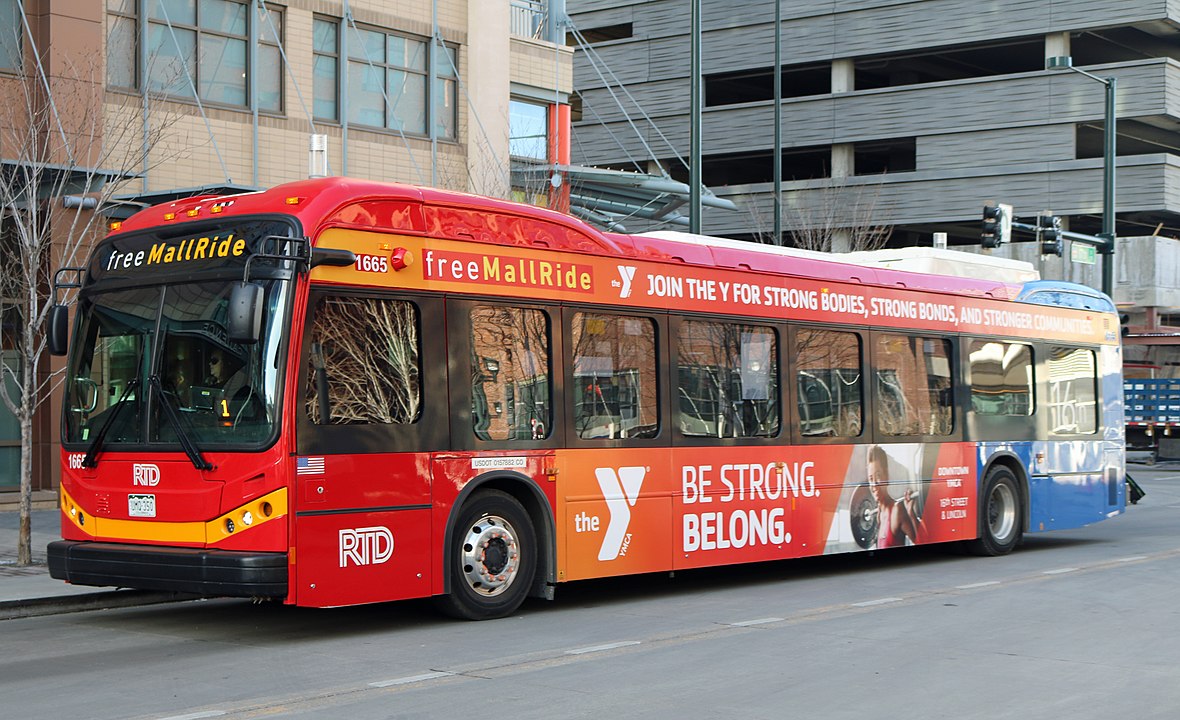February 3, 2020 | Matt Frommer
Note: A previous edition of this blog used inaccurate data from other sources to calculate the projected fuel cost savings under the new Xcel Commercial EV rate. It has been updated.
The electric bus market is booming. As of September, more than 200 transit agencies nationwide had purchased more than 2,000 electric buses. Colorado’s Regional Transit District (RTD) has one of the largest electric bus fleets in the country with 36 all-electric MallRide buses traveling up and down the 16th Street Mall in downtown Denver.
Electric buses have zero tail-pipe emissions and produce about half as much global-warming pollution as diesel buses making them better for public health and the environment. They also deliver big savings in lower fuel and maintenance costs, especially when compared to their diesel counterparts.
For example, the Chicago Transit Authority (CTA) rolled out its first two electric buses in 2014. After only four years, CTA found that each bus saved the agency $24,000 in fuel costs and $30,000 in maintenance costs annually, savings that could then be used to improve transit service and buy more electric buses.
However, these economic benefits depend on favorable electricity rates and the ability to manage bus charging at the depot. RTD found this out the hard way with its MallRide shuttles.
In 2019, the Denver Post reported that despite the anticipated cost savings of replacing the MallRide buses with electric ones, RTD was paying 60 percent more in energy costs to run electric buses than it was for its diesel buses. Fueling costs were estimated at 73 cents per mile for all-electric electric buses versus 46 cents per mile for a typical diesel bus.
As it turns out, RTD has been paying high-demand prices to recharge its electric buses. Demand charges are typically designed for large commercial and industrial customers with steady electricity load profiles, and not for periodic loads like electric bus charging. These demand charges account for about 80 percent of RTD’s annual bus electricity bill.
Electric transportation presents new challenges for the electricity grid and utilities in Colorado and nationwide. Earlier this year, the Colorado Legislature passed Senate Bill 77, which requires Colorado’s electric utilities to support transportation electrification. In response, Xcel Energy introduced a new electricity rate for commercial electric vehicle fleets, including RTD buses.
Under the new rate, which took effect at the beginning of 2020, the cost to recharge the electric buses will be less than or equal to the cost to refuel RTD’s diesel buses at $0.46 per mile. If RTD optimizes its bus charging to avoid the higher “on-peak” electricity rates and staggers the bus charging to lower the peak electricity demand, the agency could save even more money on electric buses. For example, if RTD managed to cycle the bus charging to spread the energy consumption over 6 hours instead of 3.5, an average derived from their monthly energy profile, they’d be able to reduce fuel costs by 13% per month, or $0.06 per mile. A 9-hour charging cycle could reduce peak demand further and deliver up to 24% fuel cost savings or $0.09 per mile compared to the current bus charging schedule. The time-variant fuel pricing presents new operational challenges for RTD, and they are working closely with Xcel Energy and EV charging companies to optimize their bus charging and maximize the cost savings opportunity of electric buses.
Electric buses are about 50 percent more expensive to purchase than diesel buses, a cost expected to decrease as the price of lithium-ion batteries continues to drop. But the higher upfront cost is offset by potential savings in fuel and maintenance over the lifetime of the buses.
To offset upfront costs and accelerate early adoption, state and federal agencies are awarding grants and the Colorado Department of Transportation (CDOT) recently awarded Colorado transit agencies, including RTD, $14 million to purchase 24 new electric buses and charging stations.
RTD received $8 million of the total, which it is combining with a federal grant award to buy as many as 17 new electric buses. In addition, Xcel Energy has committed to invest $1.2 million in charging infrastructure to serve RTD’s new electric buses.
Early adopters including Aspen, Denver, and Boulder County, have already set goals to fully electrify public transit buses in the coming years. Yet RTD has been reluctant to make any serious commitments on bus electrification. According to a recent Denver Post article, “RTD is planning to put 17 more electric buses out on the road starting in 2022 or 2023, though it hasn’t determined where yet.”
Based on the average transit fleet turnover, RTD replaces between 50 and 100 buses per year, which could be replaced with electric ones, but the transit agency hasn’t purchased any since rolling out the MallRide buses in 2016. Meanwhile, the Los Angeles Department of Transportation ordered 130 new electric buses from BYD last month, the largest single electric bus purchase order to date. The agency has committed to electrify all 2,500 buses in its fleet by no later than 2030. In addition, transit agencies in Chicago, New York, Los Angeles, and Seattle have committed to electrify their entire bus fleets by 2040.
According to a recent study from U.S. PIRG, electrifying RTD’s entire bus fleet would result in annual emission reductions of nearly 47,000 tons of carbon or the equivalent of taking more than 9,000 personal cars off the road. That is on top of the carbon pollution benefits RTD already provides by offering an alternative to driving for Denver Metro residents.
RTD is poised to lead Colorado on bus electrification, providing 100 percent carbon-free transportation in its service territory. With poor air quality in the metro area and the climate crisis worsening, RTD has a big role to play in electrifying the state’s transportation system. And there’s no time to waste.



